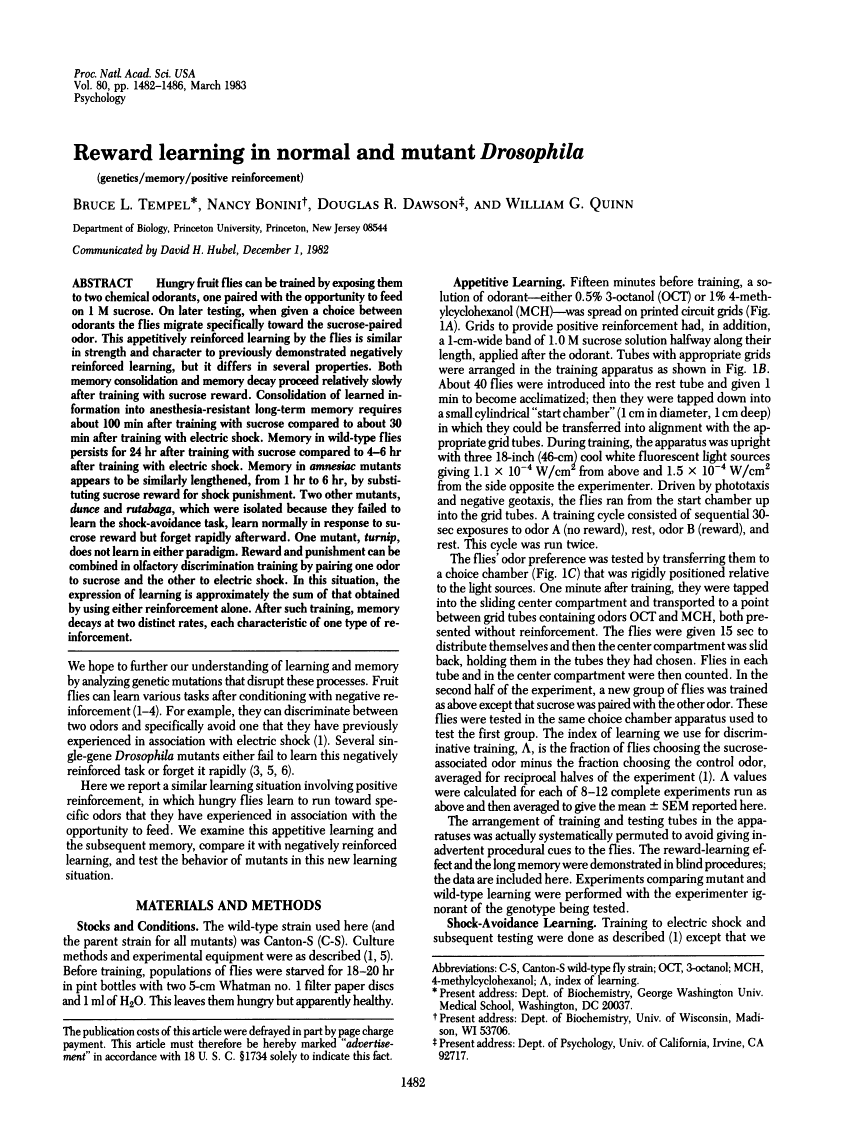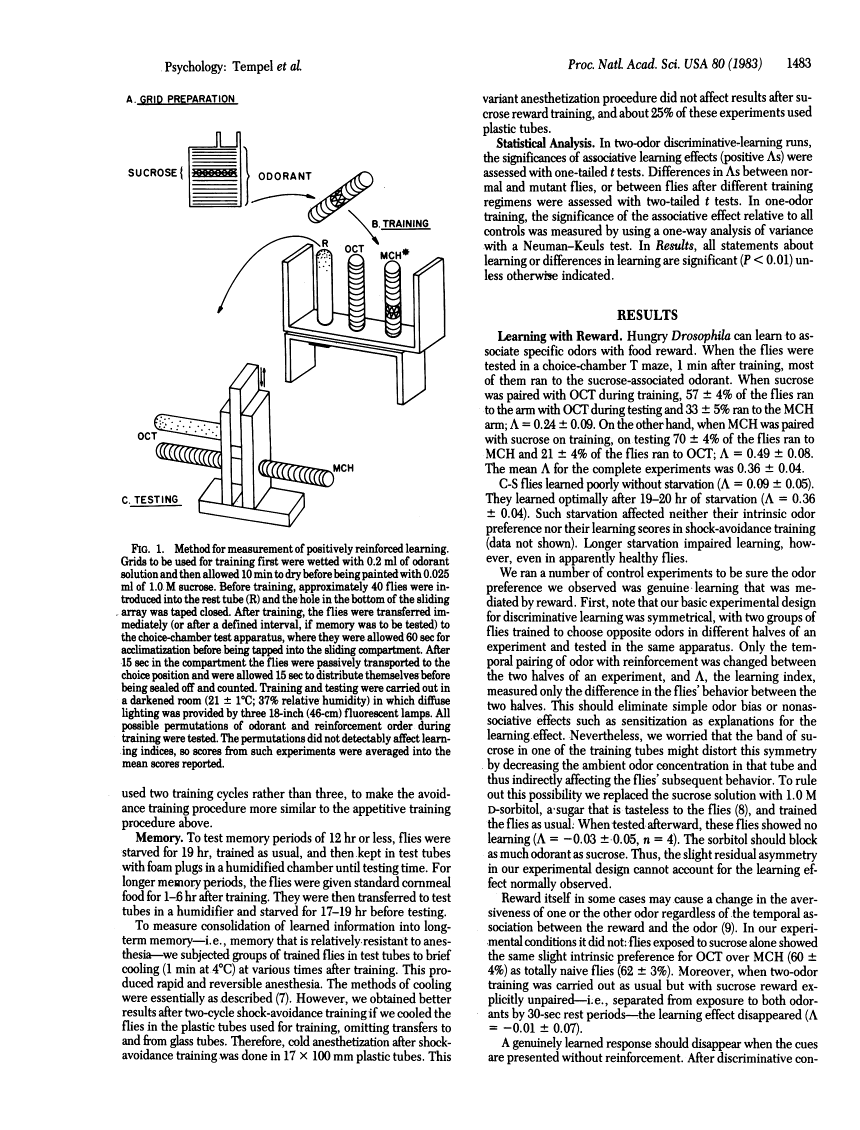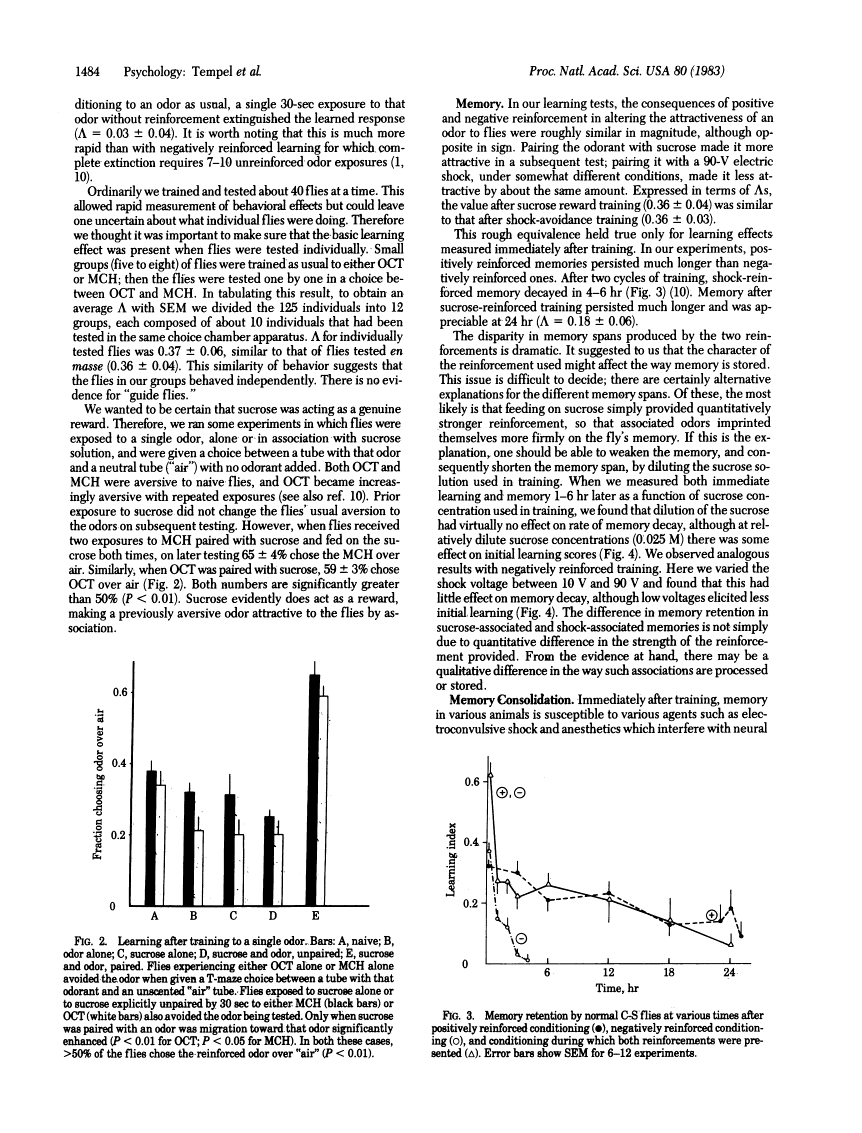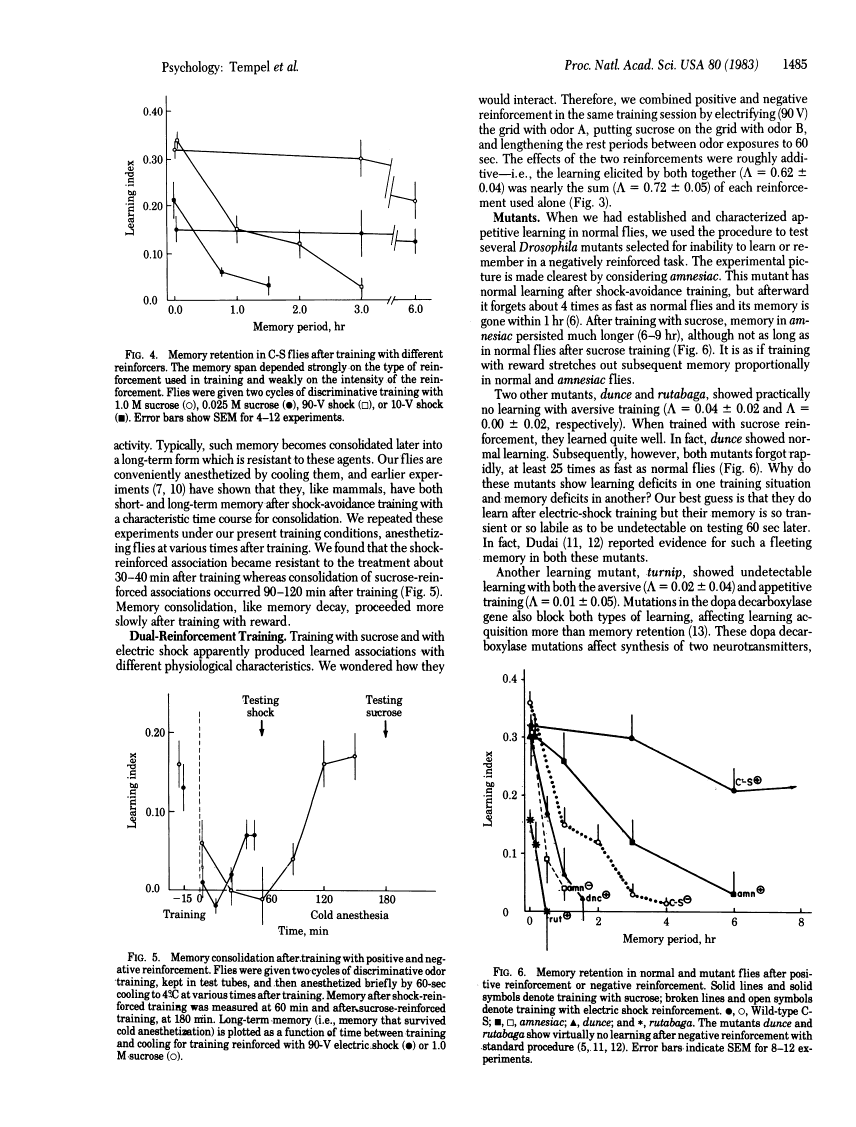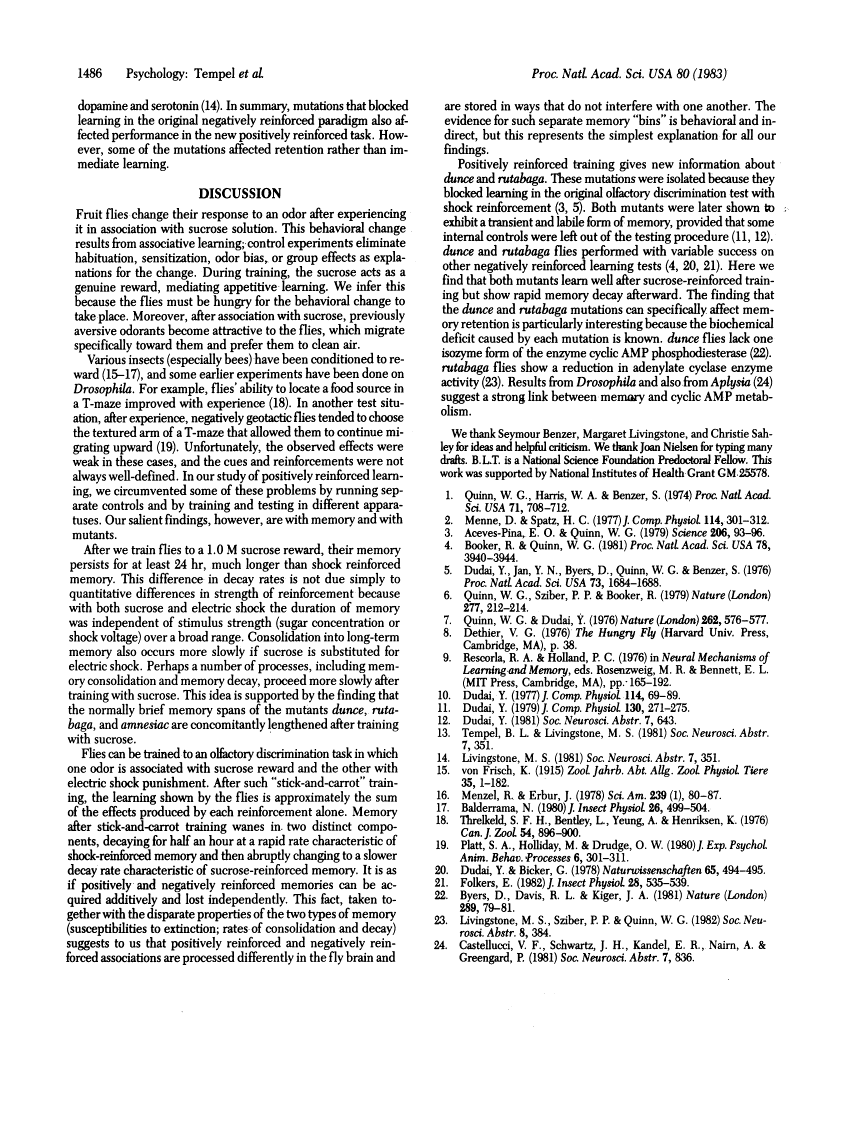Abstract
Free full text

Reward learning in normal and mutant Drosophila
Abstract
Hungry fruit flies can be trained by exposing them to two chemical odorants, one paired with the opportunity to feed on 1 M sucrose. On later testing, when given a choice between odorants the flies migrate specifically toward the sucrose-paired odor. This appetitively reinforced learning by the flies is similar in strength and character to previously demonstrated negatively reinforced learning, but it differs in several properties. Both memory consolidation and memory decay proceed relatively slowly after training with sucrose reward. Consolidation of learned information into anesthesia-resistant long-term memory requires about 100 min after training with sucrose compared to about 30 min after training with electric shock. Memory in wild-type flies persists for 24 hr after training with sucrose compared to 4-6 hr after training with electric shock. Memory in amnesiac mutants appears to be similarly lengthened, from 1 hr to 6 hr, by substituting sucrose reward for shock punishment. Two other mutants, dunce and rutabaga, which were isolated because they failed to learn the shock-avoidance task, learn normally in response to sucrose reward but forget rapidly afterward. One mutant, turnip, does not learn in either paradigm. Reward and punishment can be combined in olfactory discrimination training by pairing one odor to sucrose and the other to electric shock. In this situation, the expression of learning is approximately the sum of that obtained by using either reinforcement alone. After such training, memory decays at two distinct rates, each characteristic of one type of reinforcement.
Full text
Full text is available as a scanned copy of the original print version. Get a printable copy (PDF file) of the complete article (1.0M), or click on a page image below to browse page by page. Links to PubMed are also available for Selected References.
Selected References
These references are in PubMed. This may not be the complete list of references from this article.
- Quinn WG, Harris WA, Benzer S. Conditioned behavior in Drosophila melanogaster. Proc Natl Acad Sci U S A. 1974 Mar;71(3):708–712. [Europe PMC free article] [Abstract] [Google Scholar]
- Aceves-Piña EO, Quinn WG. Learning in normal and mutant Drosophila larvae. Science. 1979 Oct 5;206(4414):93–96. [Abstract] [Google Scholar]
- Booker R, Quinn WG. Conditioning of leg position in normal and mutant Drosophila. Proc Natl Acad Sci U S A. 1981 Jun;78(6):3940–3944. [Europe PMC free article] [Abstract] [Google Scholar]
- Dudai Y, Jan YN, Byers D, Quinn WG, Benzer S. dunce, a mutant of Drosophila deficient in learning. Proc Natl Acad Sci U S A. 1976 May;73(5):1684–1688. [Europe PMC free article] [Abstract] [Google Scholar]
- Quinn WG, Sziber PP, Booker R. The Drosophila memory mutant amnesiac. Nature. 1979 Jan 18;277(5693):212–214. [Abstract] [Google Scholar]
- Quinn WG, Dudai Y. Memory phases in Drosophila. Nature. 1976 Aug 12;262(5569):576–577. [Abstract] [Google Scholar]
- The case of the CT scanner. Sci Am. 1978 Nov;239(5):80–80. [Abstract] [Google Scholar]
- Platt SA, Holliday M, Drudge OW. Discrimination learning of an instrumental response in individual Drosophila melanogaster. J Exp Psychol Anim Behav Process. 1980 Oct;6(4):301–311. [Abstract] [Google Scholar]
- Hoffmann K. Effect of castration on photoperiodically induced weight gain in the Djungarian hamster. Naturwissenschaften. 1978 Sep;65(9):494–494. [Abstract] [Google Scholar]
- Byers D, Davis RL, Kiger JA., Jr Defect in cyclic AMP phosphodiesterase due to the dunce mutation of learning in Drosophila melanogaster. Nature. 1981 Jan 1;289(5793):79–81. [Abstract] [Google Scholar]
Associated Data
Articles from Proceedings of the National Academy of Sciences of the United States of America are provided here courtesy of National Academy of Sciences
Full text links
Read article at publisher's site: https://doi.org/10.1073/pnas.80.5.1482
Read article for free, from open access legal sources, via Unpaywall:
https://europepmc.org/articles/pmc393622?pdf=render
Citations & impact
Impact metrics
Citations of article over time
Alternative metrics
Smart citations by scite.ai
Explore citation contexts and check if this article has been
supported or disputed.
https://scite.ai/reports/10.1073/pnas.80.5.1482
Article citations
The Neural Correlations of Olfactory Associative Reward Memories in <i>Drosophila</i>.
Cells, 13(20):1716, 17 Oct 2024
Cited by: 0 articles | PMID: 39451234 | PMCID: PMC11506542
Review Free full text in Europe PMC
Preference of position in the proximity of various sugars revealed by location analysis of Drosophila melanogaster.
Sci Rep, 14(1):11285, 17 May 2024
Cited by: 0 articles | PMID: 38760389
The caloric value of food intake structurally adjusts a neuronal mushroom body circuit mediating olfactory learning in Drosophila.
Learn Mem, 31(5):a053997, 01 May 2024
Cited by: 1 article | PMID: 38862177 | PMCID: PMC11199950
Future avenues in Drosophila mushroom body research.
Learn Mem, 31(5):a053863, 01 May 2024
Cited by: 1 article | PMID: 38862172 | PMCID: PMC11199946
Review Free full text in Europe PMC
Roles of feedback and feed-forward networks of dopamine subsystems: insights from Drosophila studies.
Learn Mem, 31(5):a053807, 01 May 2024
Cited by: 1 article | PMID: 38862171 | PMCID: PMC11199952
Review Free full text in Europe PMC
Go to all (206) article citations
Data
Similar Articles
To arrive at the top five similar articles we use a word-weighted algorithm to compare words from the Title and Abstract of each citation.
Classical conditioning and retention in normal and mutant Drosophila melanogaster.
J Comp Physiol A, 157(2):263-277, 01 Sep 1985
Cited by: 607 articles | PMID: 3939242
Memory through metamorphosis in normal and mutant Drosophila.
J Neurosci, 14(1):68-74, 01 Jan 1994
Cited by: 72 articles | PMID: 8283252 | PMCID: PMC6576859
Three Drosophila mutations that block associative learning also affect habituation and sensitization.
Proc Natl Acad Sci U S A, 79(11):3646-3650, 01 Jun 1982
Cited by: 107 articles | PMID: 6808513 | PMCID: PMC346480
Associative learning: Hebbian flies.
Curr Biol, 15(11):R416-9, 01 Jun 2005
Cited by: 8 articles | PMID: 15936261
Review
